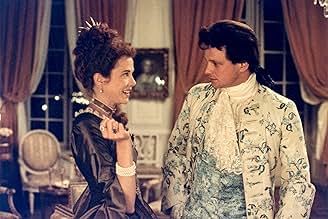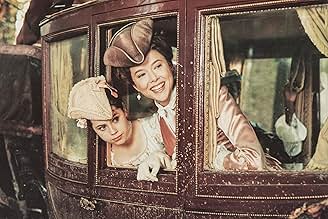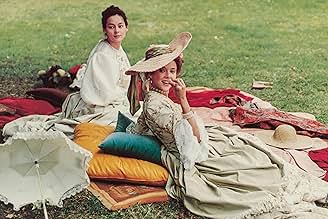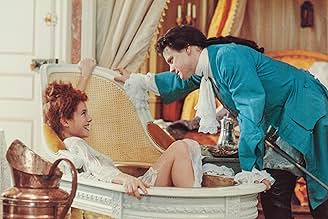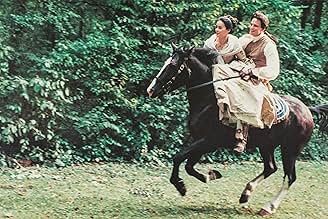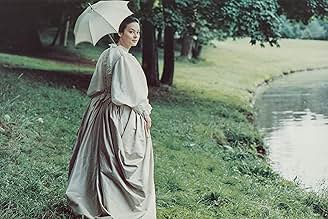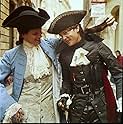AVALIAÇÃO DA IMDb
7,0/10
15 mil
SUA AVALIAÇÃO
Quando uma viúva descobre que seu amante vai se casar com a filha de sua prima, ela pede a Valmont para tirar a virgindade da menina. Mas primeiro ela aposta nele, com seu corpo como seu prê... Ler tudoQuando uma viúva descobre que seu amante vai se casar com a filha de sua prima, ela pede a Valmont para tirar a virgindade da menina. Mas primeiro ela aposta nele, com seu corpo como seu prêmio, para seduzir uma mulher jovem e casada.Quando uma viúva descobre que seu amante vai se casar com a filha de sua prima, ela pede a Valmont para tirar a virgindade da menina. Mas primeiro ela aposta nele, com seu corpo como seu prêmio, para seduzir uma mulher jovem e casada.
- Direção
- Roteiristas
- Artistas
- Indicado a 1 Oscar
- 3 vitórias e 5 indicações no total
Siân Phillips
- Madame de Volanges
- (as Sian Phillips)
Sébastien Floche
- Priest
- (as Sebastien Floche)
- Direção
- Roteiristas
- Elenco e equipe completos
- Produção, bilheteria e muito mais no IMDbPro
Avaliações em destaque
"Valmont" is a 1989 film based on the novel Les Liaisons Dangereuses by Choderlos de Laclos, as well, of course, the better-known film Dangerous Liaisons starring Glenn Close and John Malkovich.
Here, Annette Benning is the Merteuil who is stunned to learn that her lover, Gercourt (Jeffrey Jones) is betrothed to the fifteen-year-old virginal Cecile (Fairuza Balk). She makes a bet with her Casanova-like friend Valmont (Colin Firth) that he can seduce Cecile so that on her wedding night, she is not a virgin, thus giving Merteuil revenge against Gercourt. Of course, the best-laid plans and all that - Cecile is in love with her music teacher (Henry Thomas), and Merteuil aids and abets the romance as much as possible. But things become more and more complicated, with Valmont, the eternal playboy, actually falling in love himself. And as the story says, once you fall in love, your power is gone.
This film is far superior to the more famous one. Forman is a fantastic director, and the cast warms up what is basically a cold, calculated story and really makes you care.
Annette Bening is more full-dimensional than Close's Martueil - she's beautiful, smart, and she's so sweet and lies so beautifully one has no idea what she's really like. Firth's Valmont is far more believable than Malkoitch's egomaniacal portrayal.
Henry Thomas is the desperately in love music teacher - it's good casting, but he comes off as too modern. It's a minor point because the entire cast is wonderful, including Fabia Drake as Madame de Rosemond, Sian Philips, Meg Tilly, and Fairuza Balik.
The film is beautiful to look at, sumptuously and carefully produced. It's a sad case of being the second film version out when the first was better marketed with a more American cast. Nevertheless, it's not too late to discover this gem.
Here, Annette Benning is the Merteuil who is stunned to learn that her lover, Gercourt (Jeffrey Jones) is betrothed to the fifteen-year-old virginal Cecile (Fairuza Balk). She makes a bet with her Casanova-like friend Valmont (Colin Firth) that he can seduce Cecile so that on her wedding night, she is not a virgin, thus giving Merteuil revenge against Gercourt. Of course, the best-laid plans and all that - Cecile is in love with her music teacher (Henry Thomas), and Merteuil aids and abets the romance as much as possible. But things become more and more complicated, with Valmont, the eternal playboy, actually falling in love himself. And as the story says, once you fall in love, your power is gone.
This film is far superior to the more famous one. Forman is a fantastic director, and the cast warms up what is basically a cold, calculated story and really makes you care.
Annette Bening is more full-dimensional than Close's Martueil - she's beautiful, smart, and she's so sweet and lies so beautifully one has no idea what she's really like. Firth's Valmont is far more believable than Malkoitch's egomaniacal portrayal.
Henry Thomas is the desperately in love music teacher - it's good casting, but he comes off as too modern. It's a minor point because the entire cast is wonderful, including Fabia Drake as Madame de Rosemond, Sian Philips, Meg Tilly, and Fairuza Balik.
The film is beautiful to look at, sumptuously and carefully produced. It's a sad case of being the second film version out when the first was better marketed with a more American cast. Nevertheless, it's not too late to discover this gem.
I liked this better than Dangerous Liaisons which came out at about the same time. Of course Dangerous Liaisons was very good, and John Malkovich, who played Vicomte de Valmont, is an actor of power, and Glenn Close, who played the Marquise de Merteuil, is highly accomplished, but I preferred the charm of Colin Firth in this film to the brutality of Malkovich, and I thought Annette Bening was just delightful. She played Merteuil with exquisite timing and an ironic witchery and warmth that I shall not soon forget. I preferred her playful, sly wit to Close's cool cynicism.
The story comes from a novel by Choderlos de Laclos set in 18th century France that was made into a stage play by Christopher Hampton. It is a cynical satire on human sexuality as well as a very subtle examination of sexual hypocrisy and desire, a kind of oh so sophisticated laugh at bourgeois morality that would have delighted Voltaire and Moliere and greatly amused Shakespeare. It is a tale of elaborate lechery and revenge that backfires because it seems that anybody, even the most jagged rake can fall in love, and thereby become the victim. The central assumption here is the same as that of the Cavalier poets, namely that marriage kills love. As Merteuil says, "You don't marry your lover."
Meg Tilly played Madame de Tourvel with subtlety and a riveting passion. One of the great sequences in the movie occurs after she has fallen madly in love with Valmont against her will. She stands outside his doorway in the rain for hours looking adoringly and forlornly up at his window. And then she is allowed to enter and receive a cool reception. Valmont says, "Do you want me to lie to you?" and she replies desperately, "Yes," and then it is her passion that overwhelms him, leading to a beautifully ironic twist. Shortly afterward he sees Merteuil, who has become more like a sister than an ex-lover, and says, "I feel awful." She replies, "Are you surprised? (Pause) You are an awful man." Hanging his head he continues, "Do you think a man can change?" "Yes. (Pause) For the worse."
This theme, that it is the beloved who has the power and that once you fall in love you lose all power, is repeated several times in the movie. Valmont pursues women, the harder to get the better, with a relentless and maniacal passion, but once he has them, he immediately loses interest. His making love absentmindedly to Cecile de Volanges (played with wide-eyed innocence and girlish charm by Fairuza Balk) was an incredible irony when we consider what she would cost Gercourt, played with his rather substantial nose in the air by Jeffrey Jones, whom you may recall as the pratfalling principal in Ferris Bueller's Day Off (1986).
There is some insidious philosophy here, some sardonic observations on human nature worth mentioning. One is that the man beloved of women gets most of the reproductive tries, and regardless of his rakishness, is still beloved. Another is that duplicity is the accepted, even required, standard of behavior in society, and that when it comes to sex, one must, perforce, always lie.
Milos Forman's direction was invisible and therefore a work of art. The incidental scenes and backdrops depicting the color, squalor and decadence of pre-revolutionary France added just the right amount of atmosphere. The costumes were stunning and much cleaner than they would have been in reality. The elegance and beauty of all the titled people merrily contrasted with the crude ugliness of the common people, rightly reflecting the effete snobbery of the aristocracy before the time of the guillotine.
(Note: Over 500 of my movie reviews are now available in my book "Cut to the Chaise Lounge or I Can't Believe I Swallowed the Remote!" Get it at Amazon!)
The story comes from a novel by Choderlos de Laclos set in 18th century France that was made into a stage play by Christopher Hampton. It is a cynical satire on human sexuality as well as a very subtle examination of sexual hypocrisy and desire, a kind of oh so sophisticated laugh at bourgeois morality that would have delighted Voltaire and Moliere and greatly amused Shakespeare. It is a tale of elaborate lechery and revenge that backfires because it seems that anybody, even the most jagged rake can fall in love, and thereby become the victim. The central assumption here is the same as that of the Cavalier poets, namely that marriage kills love. As Merteuil says, "You don't marry your lover."
Meg Tilly played Madame de Tourvel with subtlety and a riveting passion. One of the great sequences in the movie occurs after she has fallen madly in love with Valmont against her will. She stands outside his doorway in the rain for hours looking adoringly and forlornly up at his window. And then she is allowed to enter and receive a cool reception. Valmont says, "Do you want me to lie to you?" and she replies desperately, "Yes," and then it is her passion that overwhelms him, leading to a beautifully ironic twist. Shortly afterward he sees Merteuil, who has become more like a sister than an ex-lover, and says, "I feel awful." She replies, "Are you surprised? (Pause) You are an awful man." Hanging his head he continues, "Do you think a man can change?" "Yes. (Pause) For the worse."
This theme, that it is the beloved who has the power and that once you fall in love you lose all power, is repeated several times in the movie. Valmont pursues women, the harder to get the better, with a relentless and maniacal passion, but once he has them, he immediately loses interest. His making love absentmindedly to Cecile de Volanges (played with wide-eyed innocence and girlish charm by Fairuza Balk) was an incredible irony when we consider what she would cost Gercourt, played with his rather substantial nose in the air by Jeffrey Jones, whom you may recall as the pratfalling principal in Ferris Bueller's Day Off (1986).
There is some insidious philosophy here, some sardonic observations on human nature worth mentioning. One is that the man beloved of women gets most of the reproductive tries, and regardless of his rakishness, is still beloved. Another is that duplicity is the accepted, even required, standard of behavior in society, and that when it comes to sex, one must, perforce, always lie.
Milos Forman's direction was invisible and therefore a work of art. The incidental scenes and backdrops depicting the color, squalor and decadence of pre-revolutionary France added just the right amount of atmosphere. The costumes were stunning and much cleaner than they would have been in reality. The elegance and beauty of all the titled people merrily contrasted with the crude ugliness of the common people, rightly reflecting the effete snobbery of the aristocracy before the time of the guillotine.
(Note: Over 500 of my movie reviews are now available in my book "Cut to the Chaise Lounge or I Can't Believe I Swallowed the Remote!" Get it at Amazon!)
I must confess that the first time I saw that movie, few years after it's release, I couldn't help, but find it a pale version of Stefan Freirs "Dangerous Liaison". Recently I have seen both movies and I must say that my opinion is quite the opposite now. In "Valmont" everything is subtle and I think this is why most people didn't get it. You can destroy someone's life without having written "I'm Bad!" on your forehead. With her slow-velvet voice Annette Bening is a snake under a rock:she is terrifying. As for Colin Firth's Valmont he is charming, he flies like a butterfly, but he knows exactly what he is doing. We believe in his seduction not because we are told to but because we are seduced ourselves. People have been saying that Valmont was too light, too boyish. There is nothing boyish in the way he says at Mme de Tourvelle "Is that what you want?" You see at that point how his hight-pitched voice, that goes with his voice and smile, is only a mask, as powder was John Malkovitch's mask. Colin Firth said that Milos Forman was too subtle for his own good and I think this is why some people can still find "Dangerous Liaisons" more powerful. As for "Valmont" even if the end is a bit weak, I wouldn't hesitate to say that it is from far the best version of the two movies. For those who go by the book, as I once did, you might be puzzled by the differences with the original story but for its deep sensitivity, its wonderful cast and this art of subtlety, it's really worth every moment of it.
Annette Bening has proved again what a versatile actress she is. She positively emanates cruelty and perverseness in this film, but she is the epitome of sweetness in "American President" and fragility in "American Beauty." The pleasure her character takes in causing others' pain makes one easily imagine her reincarnated as a Gestapo torturer. Colin Firth is, as usual, handsome, charming, and believable. Fairuza Balk completely captures the confusion, excitement, and naiveté one would expect of a girl reentering the world after years in a convent. Meg Tilly shows a depth that I hadn't expected and Fabia Drake is wonderful as the hard-of-hearing, elderly, but wise, matron. The costumes and sets were exquisite and evoked the period completely. I highly recommend this for the performances and the ambiance.
Milos Forman's version of 'Dangerous Liasons' was relegated to the second tier at the time of its release, which occurred close on the heels of Stephen Frears' version starring Glenn Close and John Malkovitch. I saw them both in the theatre when they were released and from the start enjoyed Forman's film far more than Frears'.
Annette Beining is a wonderful Madame de Mertueil, beautiful, intelligent, ruthless and in the end tragic. Glenn Close is pretty two-dimensional by comparison for Frears. And Colin Firth is more the laughing cavalier, with a heart, than was John Malkovitch for Frears, who mostly grimaces smugly and is highly distasteful and ego-centric. I liked Firth's sense of humor about himself, it makes the ending more poignant.
On paper some of the casting of Forman's version seems questionable, but all, except one, work very well. Most surprising was Henry Thomas's young lover. Thomas can be a dull actor but his reticent performance is apt for the gauche young man learning the ropes of 18th century Parisian society. Fairuza Bulk is delightful and funny as the virginal Céline. The supporting cast, notably Fabia Drake's dotty old Madame de Rosemond, are excellent. Siân Philips and Jeffrey Jones provide some very funny moments, though their characters are anything but "funny".
Only Meg Tilly falls short. Her American accent and modern delivery of the lines is disappointing. But she is a good actress and manages to convince in the end, though a more "Frenchified" performer would have served the story more effectively.
The music, cinematography and choreography are superb. The settings are very beautiful.
Forman's 'Valmont' deserves to be reconsidered by those critics who found it lacking when it first appeared.
Annette Beining is a wonderful Madame de Mertueil, beautiful, intelligent, ruthless and in the end tragic. Glenn Close is pretty two-dimensional by comparison for Frears. And Colin Firth is more the laughing cavalier, with a heart, than was John Malkovitch for Frears, who mostly grimaces smugly and is highly distasteful and ego-centric. I liked Firth's sense of humor about himself, it makes the ending more poignant.
On paper some of the casting of Forman's version seems questionable, but all, except one, work very well. Most surprising was Henry Thomas's young lover. Thomas can be a dull actor but his reticent performance is apt for the gauche young man learning the ropes of 18th century Parisian society. Fairuza Bulk is delightful and funny as the virginal Céline. The supporting cast, notably Fabia Drake's dotty old Madame de Rosemond, are excellent. Siân Philips and Jeffrey Jones provide some very funny moments, though their characters are anything but "funny".
Only Meg Tilly falls short. Her American accent and modern delivery of the lines is disappointing. But she is a good actress and manages to convince in the end, though a more "Frenchified" performer would have served the story more effectively.
The music, cinematography and choreography are superb. The settings are very beautiful.
Forman's 'Valmont' deserves to be reconsidered by those critics who found it lacking when it first appeared.
Você sabia?
- CuriosidadesMeg Tilly and Colin Firth fell in love while they were making the film. A year later they had a son together.
- Erros de gravaçãoWhen Tourvel is in the market, she places several food items in her basket one after the other. However, every time she does so, the basket appears empty even though she had just placed something in it a moment before.
- Trilhas sonorasDivertimento for Winds in B Flat Major, K240
Wolfgang Amadeus Mozart
Performed by the orchestra of the The Academy of St. Martin-in-the-Fields
Principais escolhas
Faça login para avaliar e ver a lista de recomendações personalizadas
- How long is Valmont?Fornecido pela Alexa
Detalhes
- Data de lançamento
- Países de origem
- Idioma
- Também conhecido como
- Valmont. Relaciones peligrosas
- Locações de filme
- Château de la Motte-Tilly, Nogent-sur-Seine, Aube, França(Madame de Rosemonde's estate)
- Empresas de produção
- Consulte mais créditos da empresa na IMDbPro
Bilheteria
- Orçamento
- US$ 33.000.000 (estimativa)
- Faturamento bruto nos EUA e Canadá
- US$ 1.132.112
- Fim de semana de estreia nos EUA e Canadá
- US$ 96.008
- 19 de nov. de 1989
- Faturamento bruto mundial
- US$ 1.132.112
- Tempo de duração2 horas 17 minutos
- Cor
- Proporção
- 2.39 : 1
Contribua para esta página
Sugerir uma alteração ou adicionar conteúdo ausente

Principal brecha
What is the Japanese language plot outline for Valmont - Uma História de Seduções (1989)?
Responda





